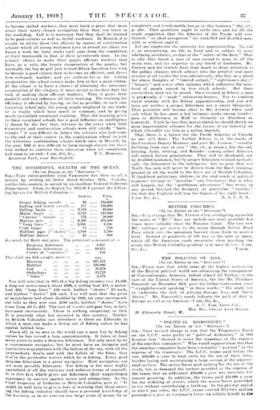THE WONDERFUL WEALTH OF THE OCEAN. [To THE EDITOR OF
TRE " SpEcriTon.-1
Sus,—Yohr correspondent from Vancouver has done us all a service by writing his letter dated October llth. Canada, unlike this country, is served by an excellent Federal Fisheries Department. From its Report for 1915-16 I extract the follow- ing figures for British Columbia:— Nuneer. Tales.
Steam fishing vessels ... 30 134,000 &Gin and motor ve.sels ... 177 136,000 Sailing boats 3,563 49.600 Motor boats ... ... 2,113 193,900 "Carrier " vessels ... 176 20,000 Marine nets ... ... 6.593 191,000 "Long lines " 3,080 1,140 Crab traps 75 150
Halibut nor 1" skates "J... 1,950 5.700
Halibut dories 42 810 So much for fleets and gear. The personnel consisted of :— Deep-sea fishermen 1,017 Inshore fishermen 10.135 Crews of " carriers " 158 Tha chief sea fish caught. were Cwt.
Herring ... ... 467,452 Halibut Oulachons 13,729 You will note that in 1915-10 a big fishing steamer cost LINO, a deep-sea motor-smack about L800, a sailing boat £11, a motor- boat 292, " long lines" 1:10 each, halibut •` skates " £3 each, and halibut "dories " £20 each. You will note that the price of motor-boats had about doubled by 1918, for your correspond- ent tells us they now cost 4180 each; halibut "chutes" have risen from .23 to .213. 'The cost of vessels and gear has, in fact, increased enormously. There is nothing surprising in this. It is precisely what has occurred in this country. Neither in Britialt Columbia nor elsewhere is there an Eldorado in which a man can make a living out of fishing unless he has capital behind him.
Above all, in no seas in the world can II man live by fishing milees lie has served a tong apprenticeship. It takes at least seven years to make a deep-sea fisherman. Not only must he be R consianniate navigator, but he must have an intimate and instinctive acquaintance with the bottom of the sea, with all the intermediate levela, and with the habits of the fishes that Rvein tho particular waters which he is fishing. Every good deep-sea fisherman is a great navigator. 3fost navigators are not even passable fishermen. For fishing is the most highly specialized of all the intricate and arduous forms of seacraft. It is this feet which gives our fishermen their unquestioned anneal:mm(7 in warfare against mines and submarines. As the Chief Inspector of Fisheries in British Columbia pots it, "It alight be well here to give a note of warning that those enter- ing the fishing industry should have a personal knowledge of the business, as in no venture can large suma of money -be so
completely and irredeemably lost as in this business " (Op. eit., p. 244). That quotation ought to settle once and for all the crude suggestion that the fisheries of the Pacific will ever furnish " an ideal Occupation " for unskilled and disabled men, wills or without capital.
Let me emphasize the necessity for apprenticeship. No toil is as unremitting. no life so hard and as subject to over- whelming mischance, as that of the " toilers of the deep." That is why they breed a race of men second to none in all the seven seas, and far superior to any breed of landsmen. Mr. Press-en and his friends have done much to draw attention to the golden chances which attract into the greatest ansl most nt.cient of all trades the true adventurers, who live on a plane fer above thoughts of " limited output." "eight-houra days." " leisure," and every other miasma which suffocates the man. hood of people reared in less stark aehools. But their curriculum insist not be mixed. Once (reined in fishery a man is practically n made " submarine-hunter. Try to confide, naval routine with his fishery apprenticeship, and yon will turn out neither a proper fisherman nor a smart bluejacket. That postulate will become elem. to Mr. tresses when (and only when) he has spent a few Intimate weeks among trawler- men or driftermen in Hull or Orimaby or Aberdeen or Lowestoft. tutil he has thus matriculated he alienist sketch DO more impressionist schemes for the future of an industry as which (literally) our fate as a nation depends.
That there is a future for the Pacific fisheries of Canada no one will deny. The halibut fishery is, in the words of the Canadian Deputy Minister, and pace Mr. Frewen. steadily declining from-year to year" (Op. cif., p. xxxix.), but the cod, herring, hake, whiting, and flounder (among other) fisheries will enrich future generations. They will be developed, mit by disabled landsmen, but by proper fishermen trained methodi- cally (by fishermen) to the enterprise. bet its pray that our North Sea men will never be driven from the finest training- ground in all the world to the freer air of British Columbia. If land-bred politicians (delvers in the arid sands of polities! economy) attempt to " um:Oise " our free-lances Out is what will happen, for the "gentleman adventurer" boa never, hi any period, brooked the drudgery of peace-lime " routine." Ott that day England aill lose the fingers of her right hand.— I am, Sir, Sr.,


































 Previous page
Previous page